Why Gravity disk?
 |
| How do I select gravity disk for Purifier? |
In a nutshell, choosing a larger gravity disk of bigger diameter causes oil flowing out of the purifier Through the water outlet, And choosing a Smaller Gravity disk may result in lesser purifying efficiency. As the outer periphery of the disk stacks are left unused.
1. When the specific gravity of the oil at 15 ℃ is known.
2. When the specific gravity of oil at a certain temperature is known.
And must-have information on purifier (It's so easy)Understanding Gravity Disk basics:
An important thing to keep in mind is that the diameter if the gravity disk is the innermost circle diameter and water flows it through the inside.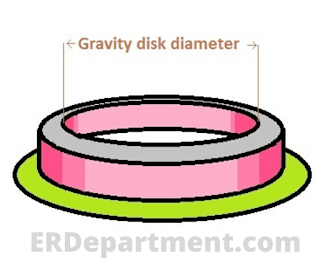 |
| The Gravity Disk Diameter is the inner circle diameter. This is important. |
(Note: Nobody calls this as the "impeller". its called a "pairing disk").
Sometimes there may be 2 impellers (AKA pairing disks). If you have SAMGONG purifier manual nearby have a look at page the 19.
You could see "IMPELLER 1" and "IMPELLER 2".
A discussion with My fellow mate, he said he didn't had any impeller for collecting water. he just had one impeller for taking that oil out.
 |
| PIC: Shows the cross-section of a gravity disk. |
How the gravity disk actually works? how interface is maintained? Can you create this in your own backyard?
Yes. Consider an empty container
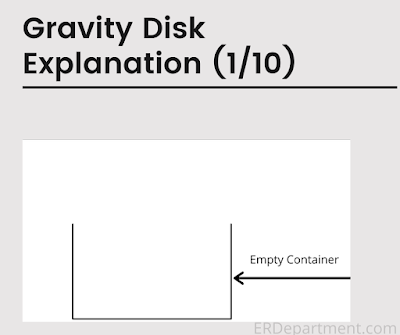 |
| An Empty container |
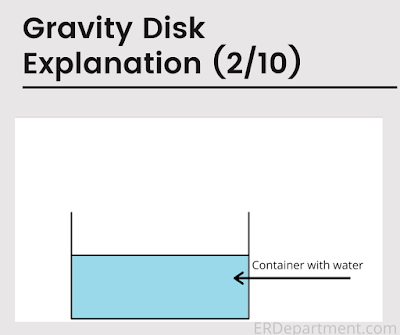 |
| adding water to the container |
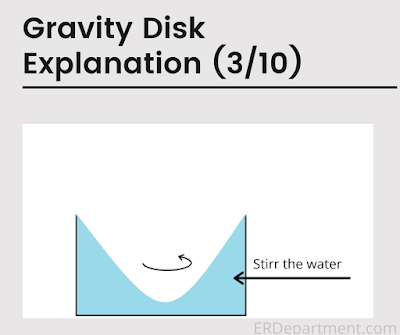 |
| stir the water and till it forms a shape like this |
 |
| Now try a different container shaped in this manner |
 |
| Add water to the new beaker fo this shape |
 |
| Now stir again, you could see a shape like this and all the water would be thrown out. |
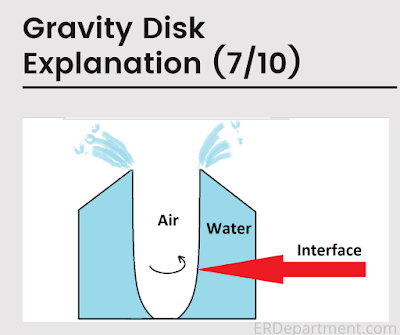 |
| Now you have a the air-water interface |
 |
| Attach a disk [gravity disk] to the mouth of the beaker |
 |
| Now with reduced mouth opening than shown in the picture (7/10) |
 |
| You can see the interface getting inside, lesser the dia of the Gravity disk, The interface moves further inwards |
Consider our classic Example :
 |
| Oil and water in a normal beaker or in a settling tank. |
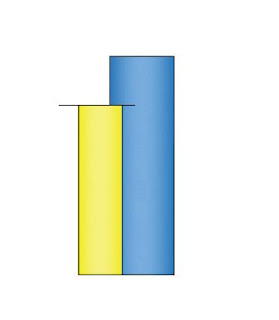 |
| Oil and water in a Vertical beaker if it's in a vertical position And rotated (or applied a centrifugal force) |
Fix a top Disk on it
Approximating a Purifier model for better understanding
Can you alter this interface?
Yes. of course.As you have seen in the above diagrams, changing the mouth diameter changes interface. And here is a little explanation of the 2 major parts if you haven't Gained it already.
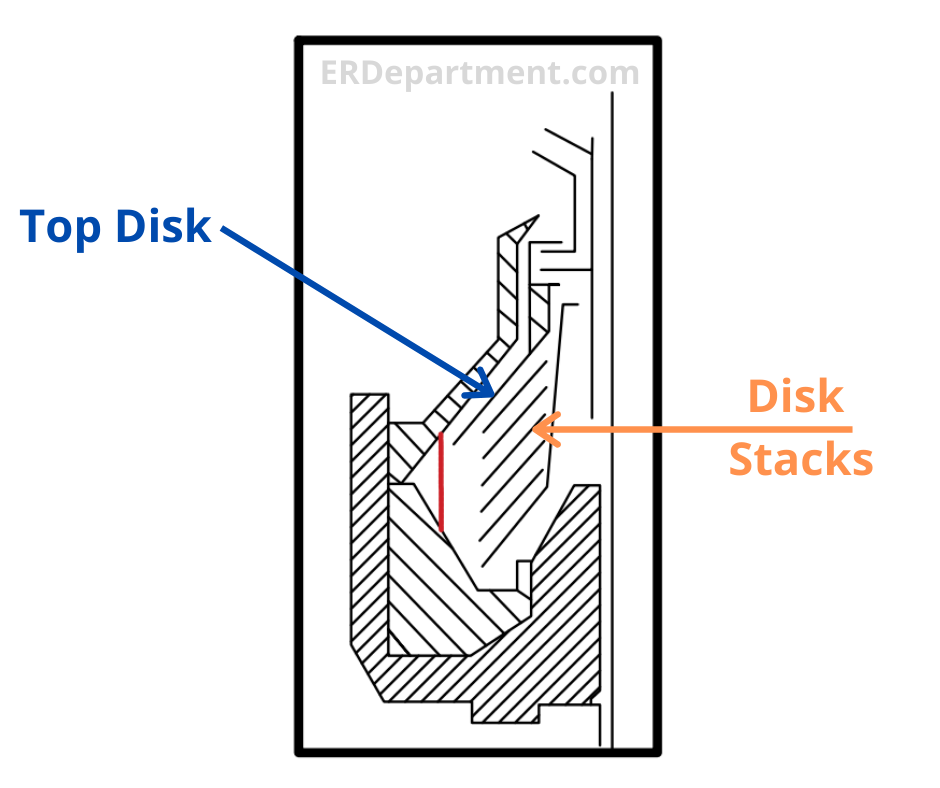 |
| PIC: Showing Purifier Disk stacks and Top disk |
Note: gravity disk dia means inner dia
(can't stress this anymore. it's that important for an easy understanding)
To gain the fullest advantage of the disk stacks, E-line should be located outside of Disk stacks.
(can't stress this anymore. it's that important for an easy understanding)
 |
| PIC: Purifier and Gravity disk and e-line representation. |
To gain the fullest advantage of the disk stacks, E-line should be located outside of Disk stacks.
if there are holes in the disk stacks, the e-line should be located inside the holes. (More citations needed on this one)
 |
| PIC: Showing Flow of oil in ideal Condition With the correct selection of gravity Disk |
And on the other hand, If the E-line is located outside of the top disk, Oil flows out to the waterside.
What happens if my gravity disk diameter is too large?
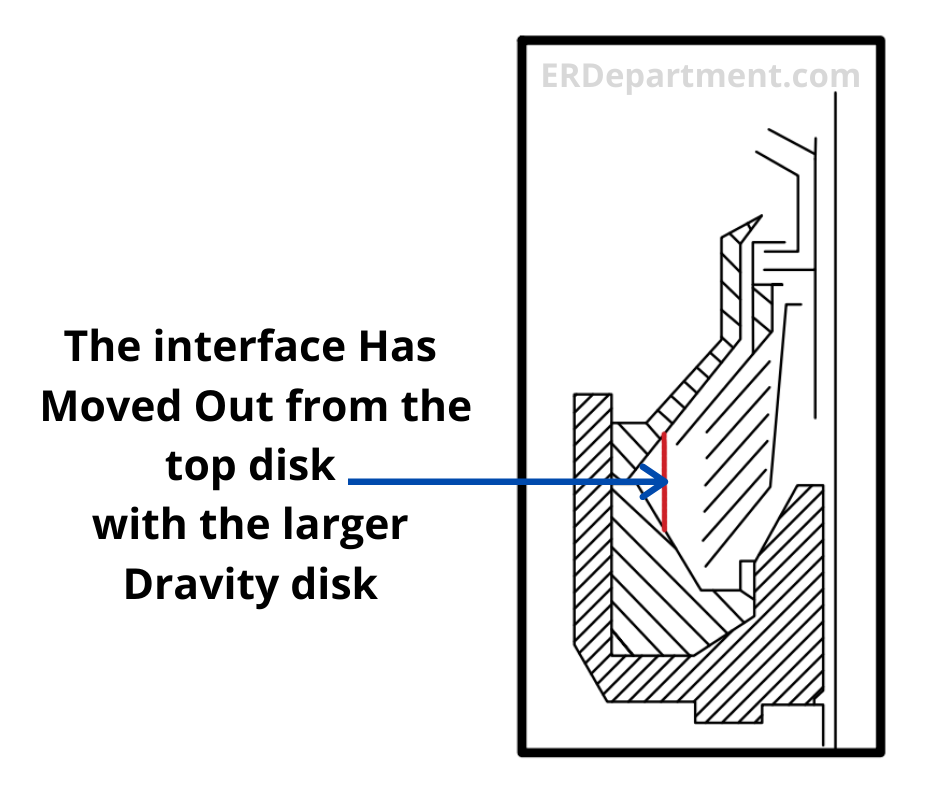 |
| PIC: Interface moves out leads to oil overflow |
Note: Water impeller section is also called a heavy liquid chamber and Oil impeller section is called a Light liquid Chamber.
What if Gravity disk is small?
Smaller Gravity disk may result in lesser purifying efficiency as the outer periphery of the disk stacks is left unused. See the diagram for better understanding
Gravity Disk Selection - Nomogram method
Pulled this out from google search query for you:
Nomogram:
A diagram representing the relations between three or more variable quantities by means of a number of scales, so arranged that the value of one variable can be found by a simple geometrical construction, e.g. by drawing a straight line intersecting the other scales at the appropriate values.
Nomogram Construction: Lines and Curves
What are the 4 Lines represented in a nomogram? (important)
1.Rising Curve
2.Falling Curve (Represented in red)
3.Horizontal line
4.vertical line
Figure 1: A simplified diagram that shows the Feed rate, temperature, and gravity disk diameter that has to be selected.
Figure 2: Added with vertical lines.
(End of Nomogram basics)
Related read: Ultra basics of Purifier and the two equations
Treating temperature : 70°C
Feed rate : 3000 L/h
Step 1: locate the specific gravity of oil in the extreme left line. (0.925)
Step 2: Draw a curved line along until it touches the vertical axis of 70°C [ line 1 ]
Step 3: From the 70°C line, Draw a Horizontal line until it touches 100°C line
[ represented as bold vertical line]
A zoomed image for a clear understanding. For mobile device
Step 4: Connect the right end of line 2 [horizontal - dotted - pink] and point it to
the feed scale using a straight line ( 3000 L / h )
Gravity disc inside diameter is obtained from the gravity disk diameter scale. here in our case, it's 79 mm [ as the pink bold line passes through section 79 ]
(Thanks to Samgong purifier manual. Extracted exact values from it)
Nomogram diagrams are different for different types of purifier models from the same manufacturer.
For example:
Samgong Purifier [ Model SJ20 G/GH ]
Samgong Purifier [ Model SJ30 G/GH ]
Samgong Purifier [ Model SJ50 G/GH ]
Has different charts (nomograms) for selecting a gravity disk
I suggest you have a glimpse this "Nomogram" in this Wiki link and familiarize with the rarely used word: Nomogram
Related Read: Purifier - Clarifier and its difference
Specific gravity of oil : 0.944 at 50 °C
Treating temperature : 98°C
Feed rate :1250 L / h
Step 1: Follow the rising curve from the specific gravity line 0.944 till the vertical line of 50°C [line 4]
[Now follow the same steps - as shown in example 1]
Step 2: Draw line 5 with the falling curve till the line of 98°C
Step 3: Draw horizontal line until it touches the vertical line of 100 °C
Step 4: From the right end of the horizontal line draw a line pointing it to feed rate scale
1250 L/ h
Step 5: Selection of the gravity disk from the gravity disk diameter scale
Related read: The 10 purifier overflow reasons that you can't miss.
2.Falling Curve (Represented in red)
3.Horizontal line
4.vertical line
Figure 1: A simplified diagram that shows the Feed rate, temperature, and gravity disk diameter that has to be selected.
 |
| PIC: Showing Inside diameter, Temperature, and The feed rate |
Figure 2: Added with vertical lines.
 |
| PIC: Purifier nomogram with Falling curve and with Vertical line |
Related read: Ultra basics of Purifier and the two equations
Example 1: The specific gravity of the oil at 15°C is known
Specific gravity of oil : 0.925 at l5°CTreating temperature : 70°C
Feed rate : 3000 L/h
Step 1: locate the specific gravity of oil in the extreme left line. (0.925)
Step 2: Draw a curved line along until it touches the vertical axis of 70°C [ line 1 ]
Step 3: From the 70°C line, Draw a Horizontal line until it touches 100°C line
[ represented as bold vertical line]
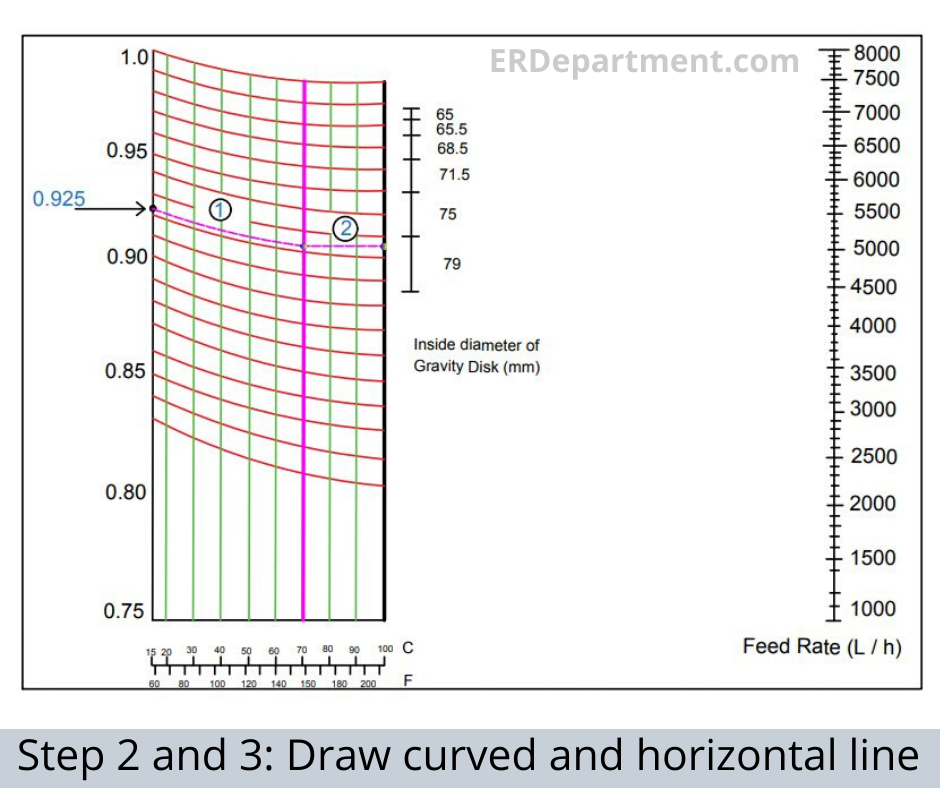 |
| PIC: Showing Steps 2 and 3 |
A zoomed image for a clear understanding. For mobile device
 |
| Purifier nomogram zoomed lines 1 and 2 |
the feed scale using a straight line ( 3000 L / h )
 |
| Purifier nomogram pointing to feed scale line from 100 C vertical line |
Gravity disc inside diameter is obtained from the gravity disk diameter scale. here in our case, it's 79 mm [ as the pink bold line passes through section 79 ]
(Thanks to Samgong purifier manual. Extracted exact values from it)
Nomogram diagrams are different for different types of purifier models from the same manufacturer.
For example:
Samgong Purifier [ Model SJ20 G/GH ]
Samgong Purifier [ Model SJ30 G/GH ]
Samgong Purifier [ Model SJ50 G/GH ]
Has different charts (nomograms) for selecting a gravity disk
All the Nomogram Charts you can find it in your Purifier Manual labeled Under
"Gravity disc selection procedure"
I suggest you have a glimpse this "Nomogram" in this Wiki link and familiarize with the rarely used word: Nomogram
Related Read: Purifier - Clarifier and its difference
Example 2: The specific gravity of oil at a certain temperature is known.
Treating temperature : 98°C
Feed rate :1250 L / h
 |
| PIC: Purifier nomogram with Up curve lines |
Step 1: Follow the rising curve from the specific gravity line 0.944 till the vertical line of 50°C [line 4]
 |
| PIC: converting to a specific gravity at 15"C |
[Now follow the same steps - as shown in example 1]
Step 2: Draw line 5 with the falling curve till the line of 98°C
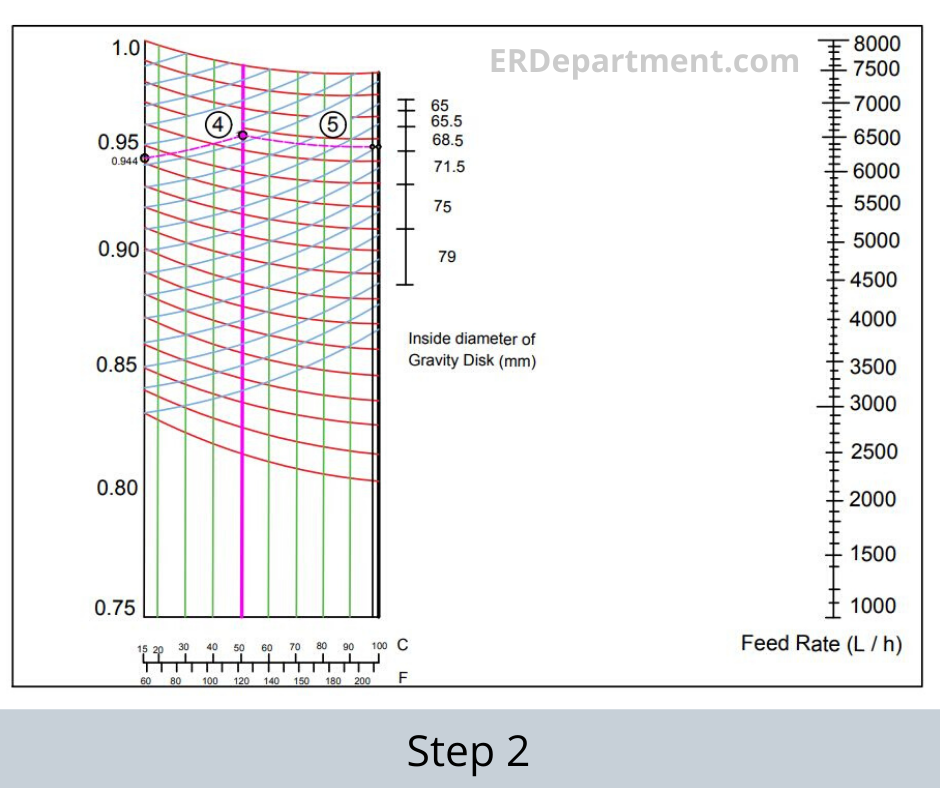 |
| PIC: locating in the operating temperature- line 5 |
Step 3: Draw horizontal line until it touches the vertical line of 100 °C
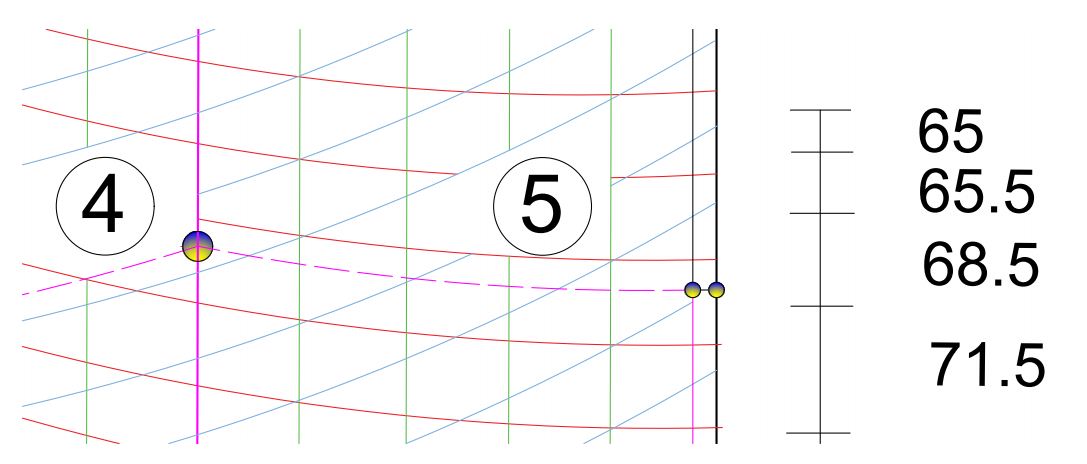 |
| PIC: A zoomed Image for mobile device |
Step 4: From the right end of the horizontal line draw a line pointing it to feed rate scale
1250 L/ h
 |
| PIC: Pointing to Feed Scale |
Step 5: Selection of the gravity disk from the gravity disk diameter scale
 |
| PIC: Selecting a Great gravity Disk. |
I believe you got value out of this and, Do share if you liked this content. A small share means a lot to me. Thank you. Have a wonderful day.




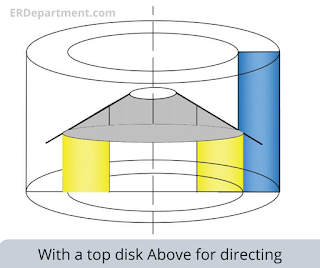
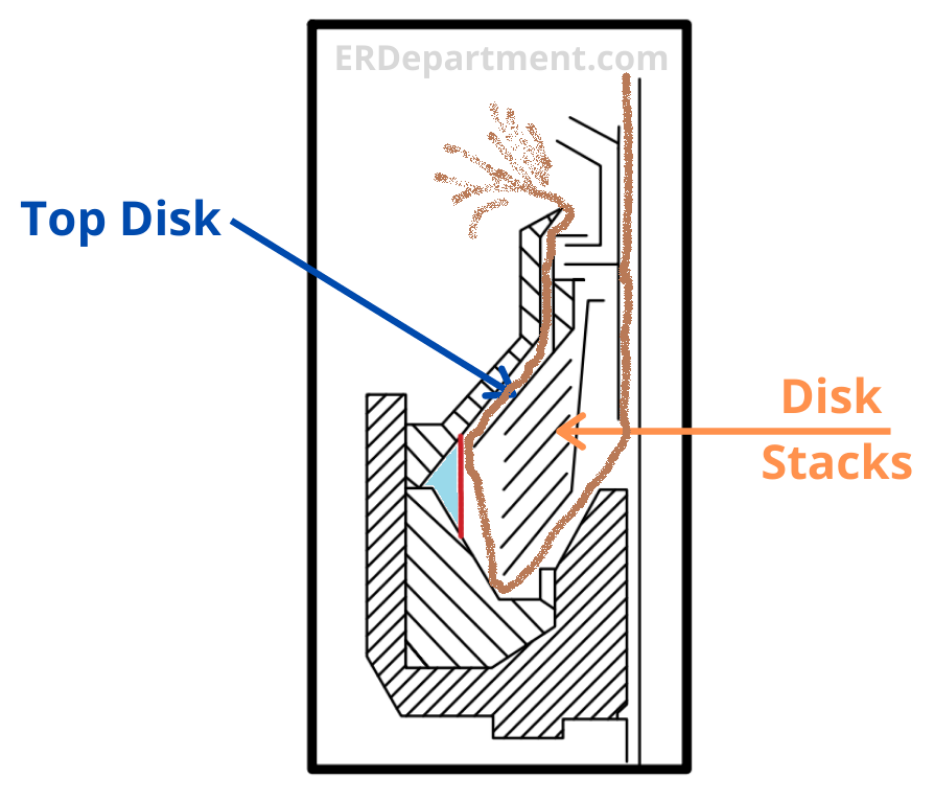








3 Comments
What if you have computed a 71.5mm diameter gravity disc size and you only have 71mm and 72mm. What are you going to choose between the two? And why?
ReplyDeleteYou better choose the 71mm as interface moving inward is better than going outward resulting overflow.
Deleteultimate explanation
ReplyDeleteFeel free to ask any doubt.